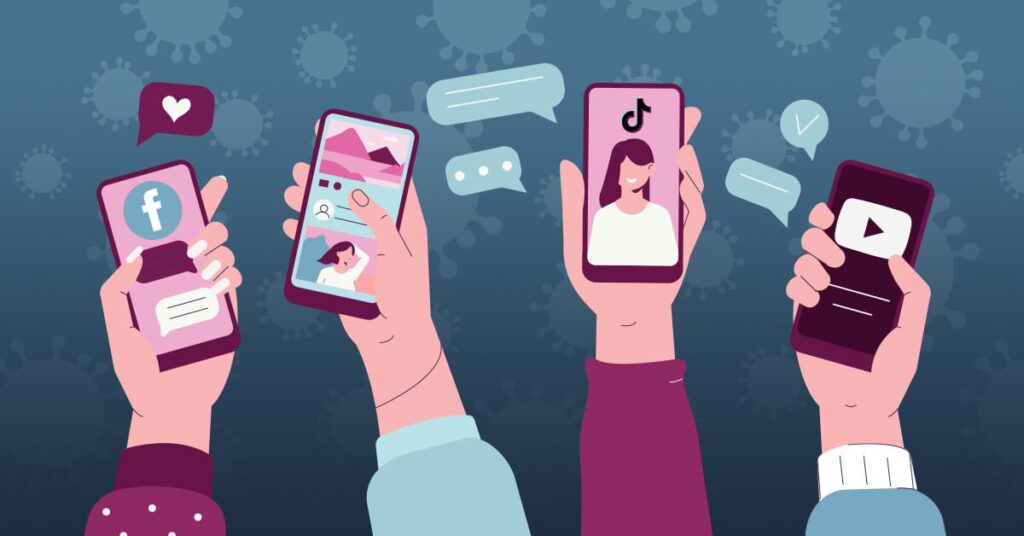Neuroscientist: “Delete your social media NOW!” “This is the best decision I’ve made in my life.”
“I promise you this will be life-changing.” “Social media is ruining your life”
Endless videos we gape upon, scrolling through social media unironically, of millions of creators retelling the new life lesson to “give up social media” and all about the jaw-dropping benefits, “surprising” results and their long-awaited update. Not one have I seen speak of how to live with social media, and not all of us are willing to deal with the costs of cutting it ALL for life. This isn’t the article that tells you all about why to stay on these apps from a marketer’s perspective – this is about the need of staying as a consumer.
Again, Why Do Quit?
Let’s state the obvious – most youths have grown up online , which makes it that they have grown a sense of dependency on the internet in general, hence attachment to their phones. Anxiety, depression and paranoia are just examples of conditions amplified by such an attachment. Research justifies these conditions by increased cases of psychological harassment, emotional desensitisation and just utter dehumanisation when being more active on socials.

It is mostly the sourcing of our dopamine highs and lows from social media apps that causes the eventual numbing of our brain and the so-called ‘dopamine detox’ trend. The combination of this and our mimetic desires lead us to the path of imitation of what we see and call “role models”. These occurrences can contribute to way too many reactions that end up with feeling overwhelmed with low self-esteem, dealing with brain fog and so forth.
So, really too many of us could use a break, facing all this on a daily basis. Admittedly, research has shown that 34% of Generation Z social media users have quit entirely and 64% have taken a break proves that there is definitely a positive bring about deleting those apps, but has it been proven to be positive to quit for good?
Why Do Not Quit?
Social media addiction is a valid addiction that undoubtedly should be sought help for, when necessary, but fully quitting social media is unsustainable, unrealistic, even unattainable for some and may in fact limit reaching full productivity despite what is promised by most of these video documentaries, posts, talks and podcasts. Not only does quitting disconnect you from loved ones, but it also puts down all the life chances, limitless resources and infinite knowledge the media has to offer.
Quitting the entirety of social media altogether from my point of view is backward thinking and will eventually make this generation’s depressed towns, that may or may not water the seeds of some conservative ideologies. Rejecting social media may be comparable to rejecting technological advancement as when both spread over the world, some people had been in denial and refused to work with them, yet society moves forward with technology and hence must with social media despite consumption issues.
Social media consumption is just like any other consumption.
The controversy of social media consumption is as a matter of fact seen in several other daily life consumption examples… How many people are against fast fashion trends, yet we keep purchasing? How many foods we eat make our bodies feel worse, yet we still eat? How is it that the air we breathe contains 78% useless nitrogen, yet we don’t somehow work to change the composition of air and still… breathe? All these examples involve us having some double-sworded weapon, or perhaps a miracle, followed by consuming it so as to manipulate it to our needs hence regulation of consumption, not utterly quitting social media.
Advocating the movement against-clickbait content and encouraging more meaningful content, Max Reisinger preaches balance and mediocracy in his TEDx Talk – how social media content consumption will need to be balanced and not totally criticised. This corresponds to all the aforementioned examples; spending more on more clothing pieces we add value to than what is the new trend; feeding our bodies more veggies than the denser foods or sugars that require more energy for the body to deal with; exhaling out all the nitrogen in the air and inhaling in the needed oxygen.
Basically, the way to regulate social media consumption is equivalent to creating a balanced diet plan for consumption that suits individual needs, which involves focusing primarily on energy-recharging and sanity-regaining social media content. This varies from person to person, but Reisinger suggests that any content defined as a form of art always helps reduce the mind-numbness and restores love and positivity – hence…
